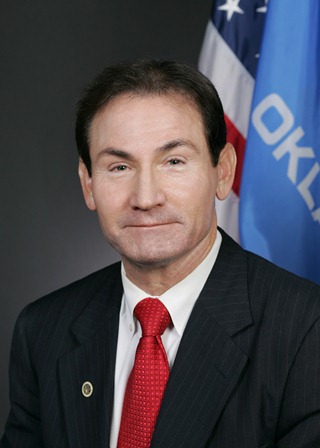In order to provide equal access and equal opportunity to people with diverse abilities, this site has been designed with accessibility in mind. Click here to view
Sharp files bills to increase oversight and accountability of virtual charter schools
 Sen. Ron Sharp
Sen. Ron Sharp
On Thursday, Sen. Ron Sharp filed legislation to modify several Virtual Charter School laws in Oklahoma. The 40-year retired educator said his bills are an effort to increase virtual charter school accountability and oversight.
“There has been public outcry in recent years to improve public education and that includes virtual charter schools where millions of taxpayer dollars are being spent with little to no accountability of expenditures, attendance or student performance,” said Sharp, R-Shawnee. “People are tired of low rankings, poor test scores and high dropout rates yet these problems exist in our virtual charter schools and the state continues to pour money into them. Educators around the state are demanding changes.”
Sharp said his bills concerning virtual charter schools were requested by several district superintendents and school board members from around the state.
“Among the issues my bills tackle is ensuring students are actually enrolled in the virtual charter school and successfully completing their work. Currently, there is no system to track whether or not students have enrolled or dropped out or are completing their studies yet these schools continue to receive state funding,” explained Sharp. “School districts are also upset that state funds are being wasted on private extracurricular lessons for virtual charter students and that they’re using state funds to provide exorbitant bonuses to teachers to recruit other teachers and students. There must be more transparency and oversight regarding attendance, student performance, expenditures and other areas.”
SB 52 would prohibit public schools, charter schools and virtual charter schools from spending state-appropriated funds on private extracurricular lessons, such as gymnastics or music lessons.
SB 53 would prohibit a dependent school district (K-8th) from converting all or any part of the district into a conversion school allowing it to act like a charter school. It also prohibits any conversion school from contracting with a management organization.
SB 54 would establish a new funding process for virtual charter schools based on course completion/progress. For the 2019-20 school year, the school would be provided monthly payments based on enrolled student performance to be tracked through student surveys that the schools would submit monthly. Payment would only be provided if a student makes a D or better in a course.
SB 55 would require all appointed members of the Statewide Virtual Charter School Board to be appointed by the Governor with the advice and consent of the Senate. Currently, only two members are appointed by the Governor. It would subject the Board to the Open Meeting Act and the Open Records Act. Among other changes, it would require the Board to employ a virtual charter school director to provide the State Superintendent of Public Instruction with information about whether the courses offered by virtual charter schools align with the state subject matter standards. The State Superintendent would be required to report twice a year to legislative leadership about the performance and funding status of virtual charter schools.
SB 56 would require virtual charter schools to submit attendance records of enrolled students to the student’s resident district. If a student fails to meet the attendance requirements established in law, the resident district would be notified, and the resident district would notify the Department of Human services (DHS) that the student might not be in compliance with the compulsory attendance law.
SB 57 would prohibit public schools, charter schools and virtual charter schools from providing bonuses for the recruitment of students or teachers.
Sharp held an interim study on Charter School Funding and Its Effect on the Education Equalization Formula in September. Presentations from that study can be found on the Senate website at www.oksenate.gov under “Committees” and “Interim Studies” (Study 18-27). The bills can also be viewed in their entirety under “Legislation” and “Basic Bill Search”.
The bills will be up for consideration in Senate committees when the legislative session begins on Monday, February 4.
 Oklahoma Senate
Oklahoma Senate

